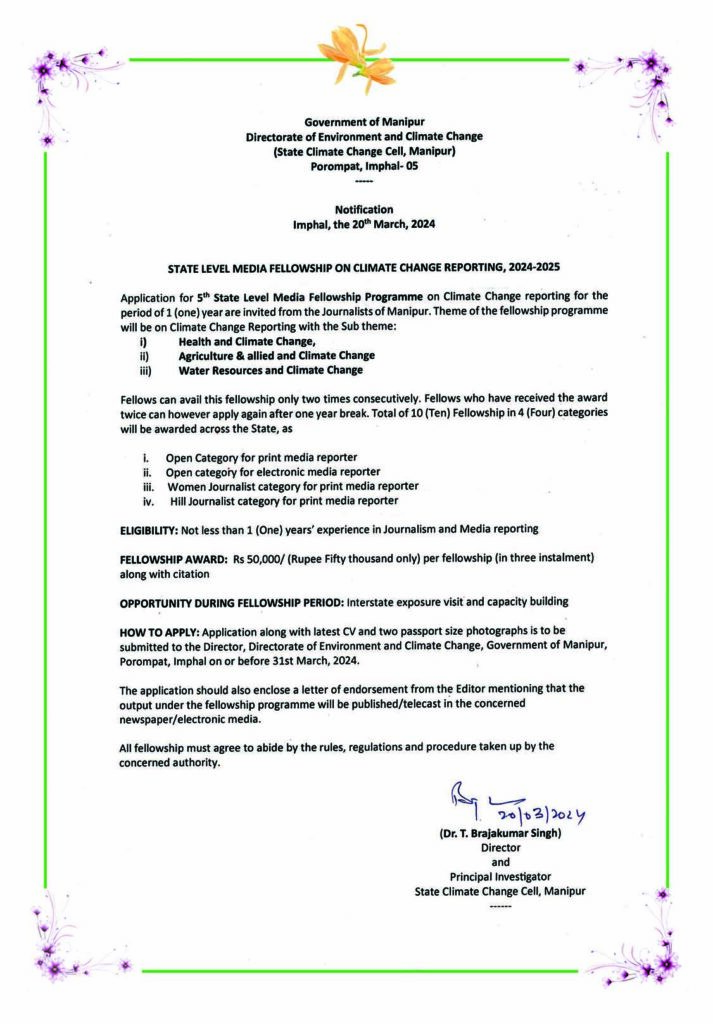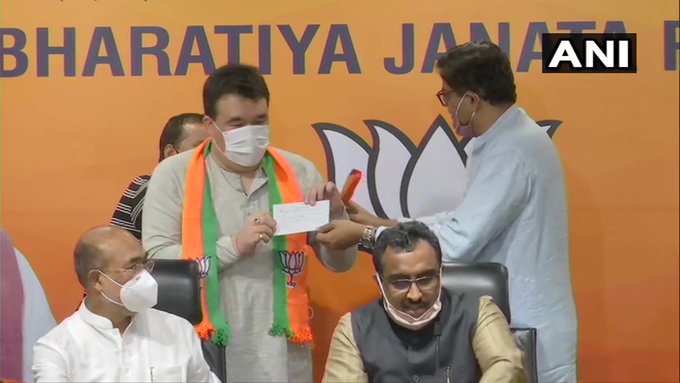The period of six consecutive months allowed by the Constitution for a non-elected individual to be Minister before contesting and getting himself/herself elected to the State Legislative Assembly expires on March 24 for Okram Henry. After this date, he will no longer be eligible to continue as minister in Nongthombam Biren’s council of ministers of the Bharatiya Janata Party (BJP)-led coalition government in Manipur.
Article 164(4) of the Constitution of India states, “A minister who for any period of six consecutive months is not a member of the Legislature of the State shall at the expiration of that period cease to be a Minister.”
It may be mentioned that Okram Henry who is now no longer a representative of the people to the Manipur Legislative Assembly was a Congress MLA but resigned when he faced a disqualification case for cross voting against his original party in favour of the BJP. He then joined the BJP and was made a minister in the BJP-led coalition government. He was elected on a Congress ticket in 2017 from Wangkhei Assembly Constituency in Imphal East district.
Okram Henry is nephew of former Chief Minister and Opposition Leader in the House, Okram Ibobi who is also the Congress Legislature Party (CLP) leader. Henry along with five Congress MLAs resigned on August 11 last year from the Manipur Legislative Assembly as a political fall out of the Rajya Sabha election held on June 19, 2020 in which BJP candidate Maharaja Sanajaoba Leishemba was elected.
It may be mentioned that Henry is also one of the five persons charge-sheeted by the Central Bureau of Investigation (CBI), Kolkata unit in a case related to seizure of a huge consignment of drugs at the Imphal airport on January 11, 2013. Charges were framed against Henry and five others by the CBI on May 22, 2017, barely two months after the BJP-led coalition government took over on March 15, 2017 and regular hearings have taken place.
The other Congress MLAs who had resigned are Md Abdul Nasir of Lilong Assembly constituency, Oinam Lukhoi of Wangoi Assembly constituency, Paonam Brojen of Wangjing-Tentha Assembly constituency, Ngamthang Haokip of Saitu Assembly constituency and Ginsuanhau Zou of Singhat Assembly constituency.
Six Congress MLAs submitted their resignations hours after the BJP-led coalition government headed by Chief Minister Nongthombam Biren won a trust vote on August 10. They were among the eight Congress MLAs who had defied a three-line party whip and skipped the trust vote for Chief Minister Nongthombam Biren. The eight Congress MLAs who abstained from the trust vote were Ngamthang Haokip of Saitu AC, Md. Abdul Nasir of Lilong AC, Oinam Lukhoi of Wangoi AC, Md. Fajur Rahim of Wabagai AC, Okram Henry of Wangkhei AC, Paonam Brojen of Wangjing-Tentha AC, Ginsuanhau Zou of Singhat AC and Yamthong Haokip of Saikhul AC.
Of the six Congress MLAs who resigned from the Congress and Legislative Assembly, except Md. Abdul Nasir all joined the BJP, and Oinam Lukhoi and Okram Henry were amongst the five new ministers inducted into BJP-led coalition government’s Council of Ministers on September 24 last year after dropping six ministers.
The newly inducted ministers included BJP MLAs Salam Rajen (Lamshang AC), Vungzagin Valte (Thanlon AC), Thokchom Satyabarta (Yaiskul AC) and two ex-MLAs Oinam Lukhoi (Wangoi AC) and Okram Henry (Wangkhei AC).
Meanwhile, of the 12 vacant seats of the Manipur State Legislative Assembly arising out of resignations and disqualifications, Election Commission of India conducted bye-elections to only five Assembly constituencies given up by Congress MLAs. It is said that bye-lections cannot be conducted in the other seven Assembly Constituencies because cases pertaining to these Assembly Constituencies are pending in court and these include Wangkhei Assembly Constituency from where Okram Henry had resigned as a Congress MLA.
In the bye-election all Congress turned BJP candidates, except Md. Abdul Nasir of Lilong AC who didn’t join BJP, were re-elected. Oinam Lukhoi of Wangoi AC is one of them and he has qualified himself to continue holding the post of Minister as he has been re-elected within a period of six consecutive months.
However, Okram Henry’s fate is still unsure as he cannot be elected as an MLA of Manipur Legislature within the stipulated six months period which expires on March 24 this year.
In the meantime, speculation doing the rounds amongst the supporters of Okram Henry and party workers of BJP is that he will resign before the expiry of the period of six months and will be reappointed as minister. Another argument doing the rounds is that he can do so because he has not been given the opportunity to get re-elected to the State Legislature as the Election Commission of India has not conducted a bye-election in Wangkhei Assembly constituency within the stipulated time.
Notably, there is no constitutional provision under which he can be reappointed as Minister after the expiry of the grace period of six consecutive months.
Regarding the law on appointment of non-elected members as ministers, the Supreme Court on August 17, 2001 said if a non-MLA has served as minister for six months without getting elected to the Assembly, he cannot be reappointed as minister during the same term of the House.
The three-Judge Bench consisting of Chief Justice AS Anand, Justice RC Lahoti and Justice KG Balakrishnan ruling on a petition challenging reappointment of Tej Prakash Singh, son of slain Punjab Chief Minister Beant Singh, as minister in 1996, after he served as minister for six months without getting elected to the Assembly said “Reappointment of such a person, who fails to get elected as a member within the period of grace of six consecutive months, would not only disrupt the sequence and scheme of Article 164 but would also defeat and subvert the basic principles of representative and responsible government.”
Further the court said, “We are of the considered opinion that it would be subverting the Constitution to permit an individual, who is not a member of the legislature, to be appointed a minister repeatedly for a term of ‘six consecutive months’ without him getting himself elected in the meanwhile.”
In S.R. Chaudhuri vs. State Of Punjab & Ors, the ruling further explained, “The clear mandate of Article 164(4) that if an individual concerned is not able to get elected to the legislature within the grace period of six months, he shall cease to be a minister, cannot be allowed to be frustrated by giving a gap of a few days and reappointing the individual as a minister, without his securing confidence of the electorate in the meanwhile.”
Records has it that Justice Anand, writing the judgement for the Bench, said “Framers of the Constitution by prescribing the time limit for ‘six consecutive months’ during which a non-legislator must get elected to the legislature clearly intended that a non-legislator cannot be permitted to remain a minister for any period beyond six consecutive months, without getting elected in the meanwhile.”
The court said that resignation by the individual concerned before the expiry of the period of six consecutive months, not followed by his election to the legislature, would not permit him to be appointed as minister once again without getting elected to the legislature during the term of the House.
“The ‘privilege’ of continuing as a minister for ‘six months’ without being an elected member is only a one-time slot for the individual concerned during the term of the legislative assembly concerned,” added Justice Anand.
Terming the grace period as personal to the individual, the Supreme Court said, “It is he who must cease to be a minister if he does not get elected during the period of six months. The privilege is not of the Chief Minister on whose advice the individual is appointed.”
Even under different Chief Ministers during the term of the same assembly the same individual cannot be reappointed as minister beyond the period of six consecutive months if he is not elected to the Legislature.
Chief Justice Anand said, “The change of a Chief Minister, during the term of the same assembly would, therefore, be of no consequence so far as the individual is concerned.”
“Therefore, it is not permissible for different Chief Ministers to appoint the same individual as minister, without him getting elected during the term of the same assembly,” the Supreme Court said.
The Supreme Court held that reappointment of Tej Prakash Singh was “invalid and unconstitutional”.
Chief Justice Anand said, “Article 164(4) is at best only in the nature of an exception to the normal rule of only members of the legislature being ministers, restricted to a short period of six consecutive months. This exception is essentially required to be used to meet extraordinary situation and must be strictly construed and sparingly used.”
In BR Kapoor vs State of Tamil Nadu the five-bench judgement of the Supreme Court consisting of Justice GB Pattanaik, Justice SP Bharucha, Justice Brijesh Kumar, Justice YK Sabharwal, Justice Ruma Pal on September 21, 2001 not only reiterated this view but further strengthened the restrictions on use of Article 164(4) by non-legislators. Justice GB Pattanaik held: “Founding fathers allowed a competent person to be appointed as Chief Minister or a Minister for a limited period of six months, who might have been defeated.”
Justice SP Bharucha held in the judgement: “The framers of the Constitution had not visualised that a non-legislator could be repeatedly appointed a Minister, for a term of six months each, without getting elected because such a course struck at the very root of parliamentary democracy. It was accordingly held that the appointment of Tej Prakash Singh as a Minister in Punjab for a second time was invalid and unconstitutional.”
Therefore, there is no constitutional provision or legal guarantee that Okram Henry can continue or he can be reappointed as Minister after the expiry of the grace period of consecutive six months on March 24.
There is also no possibility of holding bye-election even if the pending court cases are cleared as the remainder term of the present Assembly will be less than a year, because Section 151A of Representation of the
People Act 1951 says election or nomination to vacant seats in the Legislative Assembly or Council cannot be done “if the remainder of the term of a member in relation to a vacancy is less than one year”.
Hence, the fate of Okram Henry who is one of those who propped up the BJP-led coalition government under Chief Minister Nongthombam Biren is not expected to favour him beyond March 24.
Here some pertinent questions crop up. Shall he remain as a hero sacrificing the rights of the people of Wangkhei Assembly Constituency, or become a political victim losing the ministerial berth and one year without being a representative of his constituency to the legislature? Or is it that his destination is deliberatley determined and chosen by himself, or is it compelled by political compulsions, for reasons known to him only?
However, many wonder about the continuity of Okram Henry as Minister extra-constitutionally, and if that could be a magic the BJP could conjure to make him continue as Minister.

Book on Manipur Crisis Long on Conjectural Assertions, Short on Documentation and Evidence
Book Title: Shooting the Sun: Why Manipur Was Engulfed by Violence and the Government Remained Silent Author: Nandita Haksar Published by: Speaking Tiger Price: Rs 399 Nandita









